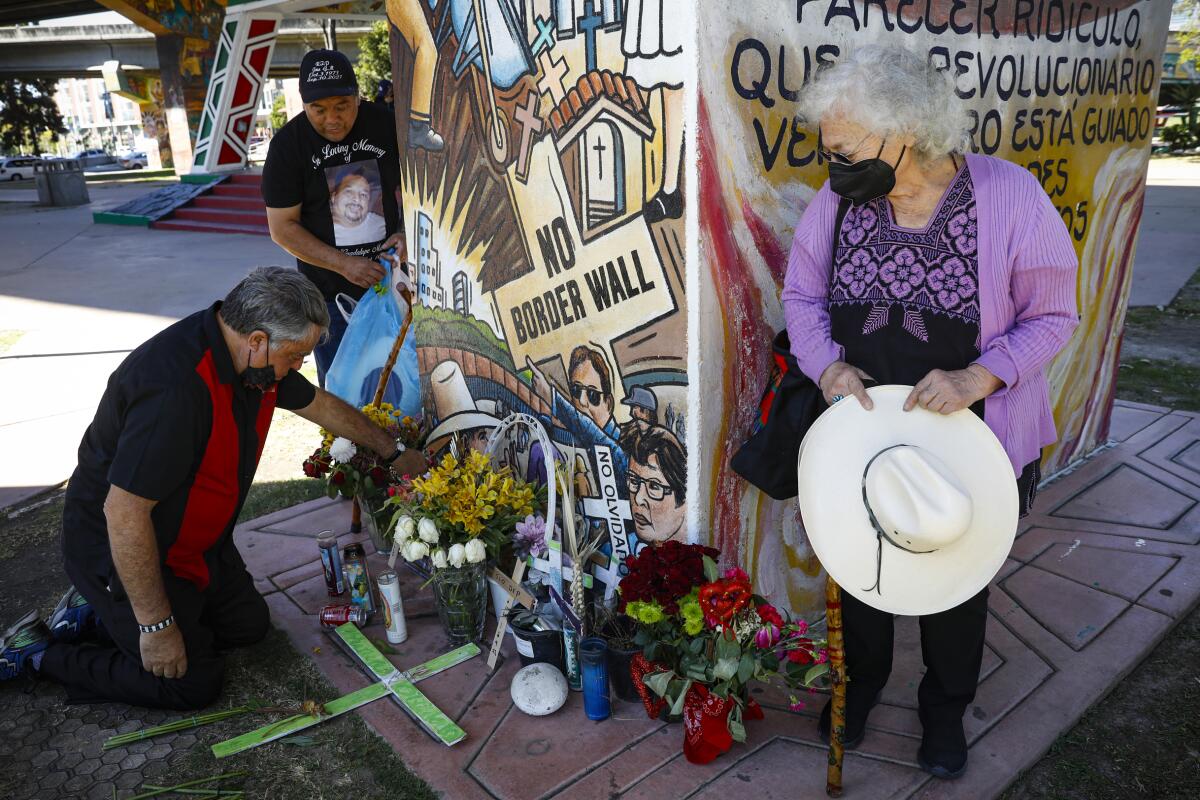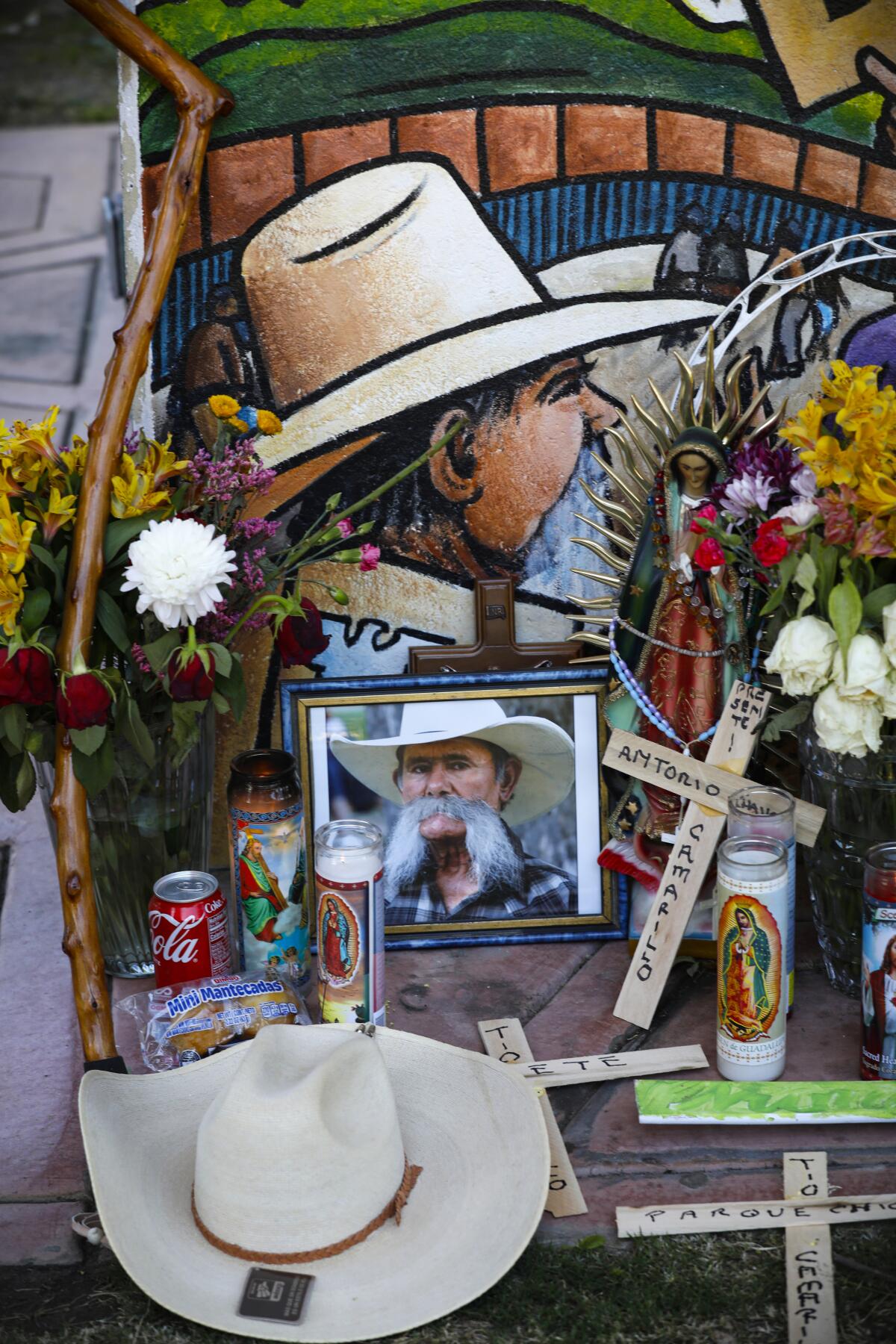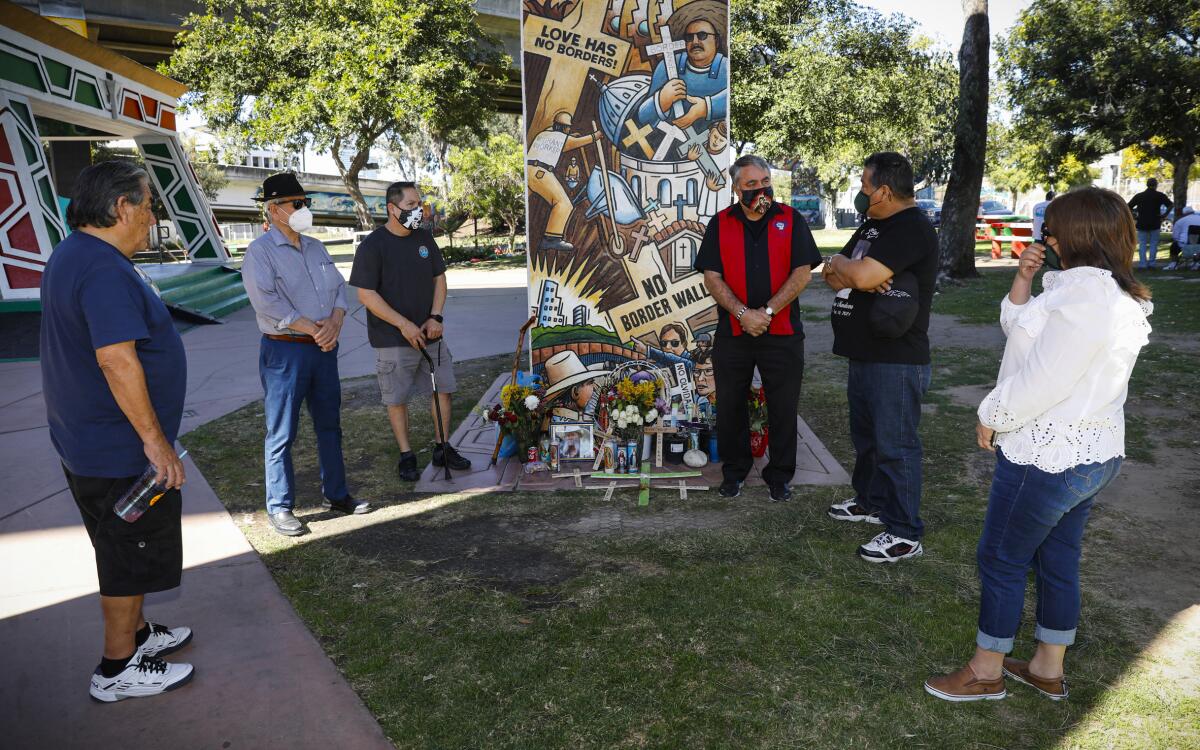Community mourns the loss of a park’s ‘guardian angel’

‘Tio’ was regarded by locals as the unofficial groundskeeper and guardian of a park in San Diego’s Barrio Logan neighborhood.
- Share via
SAN DIEGO — For more than four decades, Antonio Chavez Camarillo would wake up and set off to “work” at Chicano Park, armed with cleaning supplies.
He was known by locals as the park’s unofficial groundskeeper, guarding and tending to it each day to ensure it was welcoming to visitors. Without an official job or pay, it was his love for the rich history of the Barrio Logan park in San Diego and a need to preserve it that his friends say truly made him the park’s guardian angel. The park is located beneath the San Diego-Coronado Bridge.
After his death on Feb. 9, friends of the 82-year-old, best known as “Tio,” created a memorial at the park to honor him, placing it next to a mural in which he is depicted, with his long, white mustache and wearing his ever-present white sombrero.
Now his friends are trying to find Chavez Camarillo’s family members in Mexico. They have been working with the Mexican consulate to locate relatives so they can set up a funeral service for him.
“We want to show him how much he is loved and appreciated for his decades of being the ‘unofficial caretaker’ of Chicano Park,” said Enrique Morones, a local activist and friend.

“He was such an icon and definitely a very important part of Chicano Park,” Morones added.
Not much is known about Chavez Camarillo, except that he immigrated to the U.S. in 1956 from Guanajuato, Mexico, when he was 17.
Back when Morones was a high school student, he recalls often seeing Chavez Camarillo sitting on a bench watching over the park.
“Nobody was more present at Chicano Park than he was,” said Morones, now 65. “He would just be sitting there with his hat, his big mustache, his boots and his huge heart ... He was just such a beautiful soul and very unpretentious.”
Chavez Camarillo made it his duty to keep the park clean and safe for the community, who his friends say were his only family.
Jose Mendoza, who was Chavez Camarillo’s best friend for more than two decades, said he can attest to his friend’s dedication to the park and its visitors.
“He very friendly with everyone here in the park,” Mendoza added.

Gloria Andrade said she, too, recalls noticing Chavez Camarillo frequently at the park years ago, when she began using the Kiosko, or the central gazebo, to practice Aztec dances with three generations of her family.
“We were forgetting the steps,” she said, “and the steps are very important, they have to be exactly correct, [because] the dancing is a prayer.”
Each week, they’d ask to borrow Chavez Camarillo’s broom to sweep the stage, and each week he sat on the same bench, smiling as he watched them dance, Andrade recalled.
“I was really impressed with his humility and his kindness,” she said. “He was friendly in a gentle way.”
Andrade said he was one of those people who just struck her as “good.”
“I could tell he was really pleased ... and really enjoyed watching us dance,” she added. “I think it just made him happy to see how the generations can really share love and do things together ... and I think he may have felt included in our little family.”
Soon, Andrade said, she began to feel as if he were family, a sentiment that only grew when she found out he and her grandfather were both from the same part of Guanajuato.
“I just related the two: a grandfather who I never knew, and this old man from the same place,” she added.
Artist Salvador Barajas was one of Chicano Park’s original muralists and has painted several murals through the years, including the “No More Wall” mural where Chavez Camarillo is featured.
Though he didn’t know him personally at the time, Barajas said he saw Chavez Camarillo regularly at the park prior to painting the mural in 2017.
“He was a regular,” Barajas said, “taking care of Chicano Park, sweeping the floor, picking up trash ... He was there all the time.”
While Barajas was painting the mural, Chavez Camarillo would leave him alone and quietly watch him paint but was evidently happy when his image was added to the pylon, he said.
Each mural painted on the pylons shares the history of the park, and Chavez Camarillo was honored to have earned a spot among the illustrations, his friends said.
“He was so excited ... and very proud,” Morones said of the mural, which he commissioned.
Though Chavez Camarillo had been in a physical rehab facility for some time, his friends kept visiting him and say he always spoke of the park.
More to Read
Sign up for Essential California
The most important California stories and recommendations in your inbox every morning.
You may occasionally receive promotional content from the Los Angeles Times.












